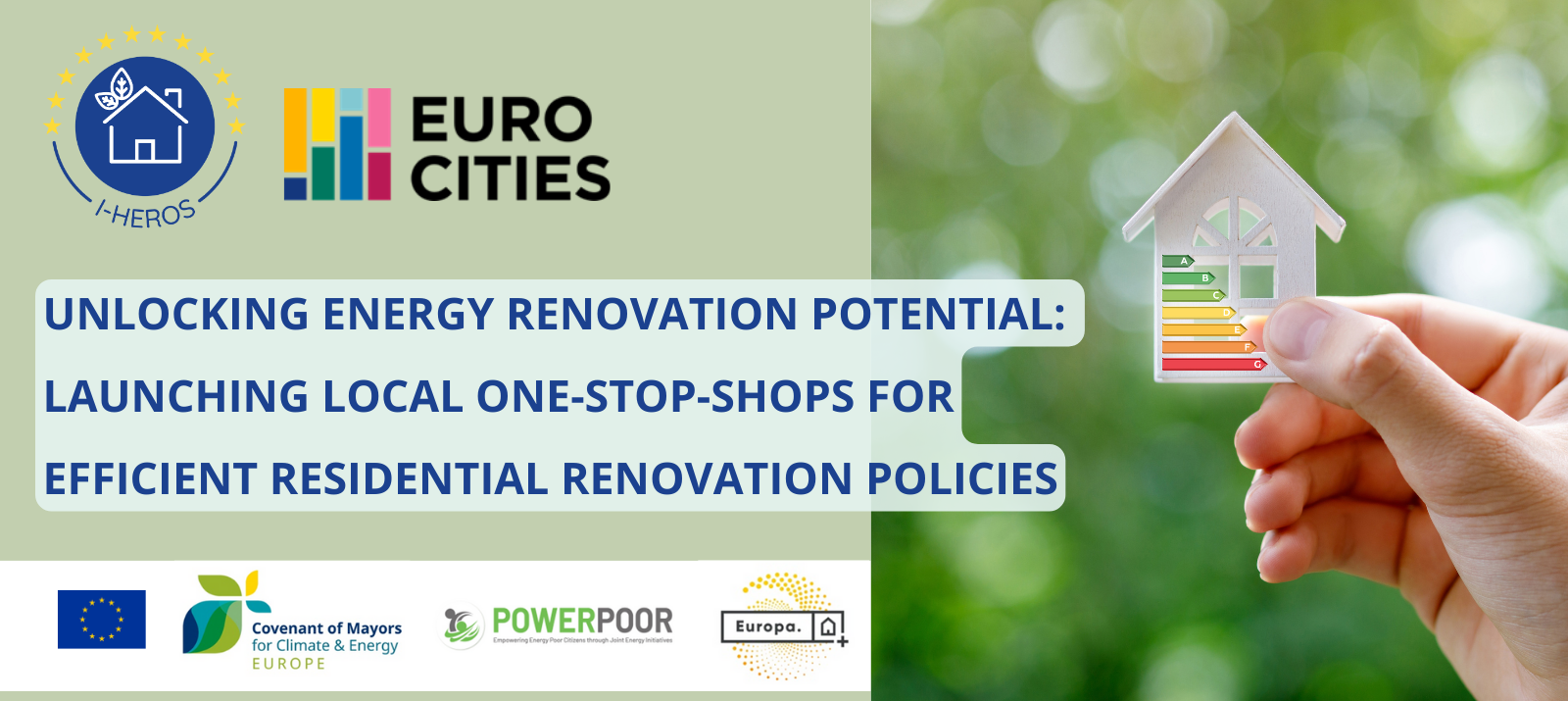
.
Expected Outcomes
- What are cities’ most pressing current and future challenges for the creation of Integrated Home Renovation Services (IHRS)?
- How can we replicate our local practices to boost building renovations?
- What financing systems are needed to set up a sustainable system in terms of One-Stop-Shops (OSS)?
Background
The residential sector represents nearly 75% of all buildings and 25% of Europe’s total energy consumption mix¹. Improving the energy efficiency of residential buildings is therefore a key factor in achieving carbon neutrality by 2050. It is also estimated that approximately 75% of the building stock that will exist in 2050 has already been constructed². This pursuit of energy sobriety must, therefore, imperatively manifest itself through the energy-efficient renovation of existing residential buildings. Despite this, depending on the year and the country, the annual renovation rate fluctuates within the range of 0.4% to 1.2%. At this pace, it would necessitate over a century to complete the renovation of the European housing stock³.
Over the past few decades, in response to national and European environmental challenges, cities have established ambitious targets as they drive the energy transition locally4. Concerned by the wellbeing of their citizens, cities play a key role in bringing citizens on board to actively participate to the energy transition. They set up One-Stop-Shops (OSS) and Integrated Home Renovation Services (IHRS) to overcome a number of barriers that currently limit the deep renovation rate of private households and to foster the rate of energy efficiency improvements in the residential sector.
Aim
The revised Energy Performance of Buildings Directive, currently under negotiation, highlights the key role of local governments in the set up and operation of home renovation services. The European Parliament has proposed to establish at least one one-stop-shop per region and in any event per 45 000 inhabitants, with a harmonized approach to be implemented in member states. This means that our OSS and IHRS systems will have to be stepped up. The aim of this webinar, based on feedback from several OSS, is to present the future challenges for urban renovation policies. More specifically, and thanks to some concrete examples of OSS implementation, we will reflect about how these services can be expanded and replicated, and what key conditions are needed to make them sustainable in the long-term.
AGENDA
-
Introduction and Moderation, by EUROCITIES
– by Eugenia MANSUTTI, Senior Policy & Project Coordinator -
Opening remarks by CINEA:
Policy context & Overview of One-stop-shops for home energy renovation in the EU
– by Nathalie CLIQUOT, Project Adviser & Christophe MILIN, Project Adviser -
I-HEROS project presentation:
Challenges to boost renovation of private homes and lessons learnt
– Joanne LESAGE, Energy Renovation Policy Officer, Toulouse Métropole & Lucas ESTAY, Research engineer and PhD candidate, INSA Toulouse. -
POWERPOOR project presentation :
Empowering energy poor citizens through joint energy initiatives.
– by Eleni KANELLOU, POWERPOOR Project Coordinator -
EUROPA project presentation:
One stop shop approach implemented in Piemonte Region to speed up the renovation wave
– by Silvio DE NIGRIS, EUROPA Project Coordinator -
EU Peers presentation:
The European Community of Practice for One-Stop-Shops dealing with residential energy renovation
– by Jenny-Claire KEILMANN, EU Peers CoordinatorQ&A with speakers
Wrap-up & closure of the webinar speakers
About EUROCITIES
Eurocities is the largest network of European cities. It counts over 200 large cities among their membership, representing more than 150 million people across 38 countries, from within and outside the European Union. Eurocities provides a platform to share knowledge and ideas, to exchange experiences, to analyse common problems and develop innovative solutions, through a wide range of forums, working groups, projects, activities and events. Eurocities gives cities a voice in Europe, by engaging in dialogue with the European institutions on all aspects of EU legislation, policies and programmes that have an impact on cities and their citizens. The network is active across a wide range of policy areas including: economic development and cohesion policy, provision of public services, environment, transport and mobility, employment and social affairs, culture, education, information and knowledge society, governance and international cooperation.
References
1- Sofia Tsemekidi Tzeiranaki and others, ‘Analysis of the EU Residential Energy Consumption: Trends and Determinants’, Energies, 12.6 (2019), 1065 <https://doi.org/10.3390/en12061065>.
2- European Commission. Directorate General for Energy., IPSOS., and Navigant., Comprehensive Study of Building Energy Renovation Activities and the Uptake of Nearly Zero-Energy Buildings in the EU: Final Report. (LU: Publications Office, 2019) <https://data.europa.eu/doi/10.2833/14675> [accessed 27 October 2023].
3- European Commission. Joint Research Centre., Achieving the Cost-Effective Energy Transformation of Europe’s Buildings: Combinations of Insulation and Heating & Cooling Technologies Renovations : Methods and Data. (LU: Publications Office, 2019) <https://data.europa.eu/doi/10.2760/278207> [accessed 27 October 2023].
4- Alain Quinet, The Value for Climate Action – A Shadow Price of Carbon for Evaluation of Investments and Public Policies (France Stratégie, 2019).


